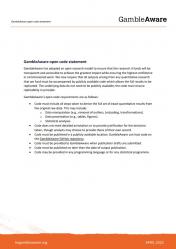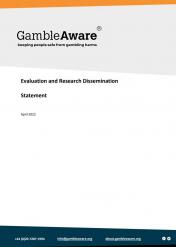New research highlights social inequality and discrimination link to gambling harms for Minority groups
GambleAware has published new research focusing on the experiences of gambling and gambling harms among Minority groups in Great Britain.
- Research from Ipsos UK, and ClearView Research, supported by the University of Manchester, shows that despite lower rates of participation in gambling (31% vs 48%), members of Minority groups1 are more likely to experience some form of harm from gambling relative to members of White British majority groups (42% vs 20%) of those who gamble2.
- Findings highlight a number of structural factors demonstrated to be associated with higher levels of gambling harm. These include income levels, social inequalities and experience of discrimination.
- Results underline the need for further research for and with these communities, to identify support for gambling harms that is tailored to address specific unmet needs and vulnerabilities.
London, 21 March 2023: GambleAware, the leading charity commissioning gambling harm prevention and treatment services, has today published new research focusing on the experiences of gambling and gambling harms among Minority groups in Great Britain1.
The research, based on a nationally representative survey, found that those from Minority groups were less likely to have gambled in the past four weeks than White British people (31% vs 48% respectively). However, amongst people who gamble, those from Minority groups were twice as likely to be experiencing any level of gambling harm (42% vs 20%).
Niamh McGarry, Director of Impact at ClearView and contributor to the report, said: “Whilst further research is needed to establish what drives higher burdens of gambling harms in Minority communities, these results clearly highlight that members of these communities are facing increased vulnerabilities and are more at risk of suffering from gambling harms.
“Services must be designed with the voice of Minority communities centred throughout, and this research helps demonstrate that specific attention and specialised support is needed to effectively address these inequalities.”
The survey shines a light on the wider factors that might contribute to or compound specific vulnerabilities. An analysis of responses from the survey revealed that amongst those who gamble, members of Minority groups are:
- Three times more likely than the White British Majority group to use gambling as a coping mechanism in response to challenges and difficulties in life (18% vs. 6%)
- More likely than the White British Majority group to say that they would like to limit their gambling but are finding it difficult to do so (9% vs. 1%)
- More likely than the White British Majority group to report intention to reduce their gambling (28% vs. 14%)
- Slightly less likely than the White British Majority group to feel comfortable seeking formal support for their gambling, often due to fear of judgement and stigma (58% would feel comfortable vs. 61%)
The research identifies a potential relationship between experiences of discrimination and of gambling harm. It found that among people from a Minority background, those experiencing any form of gambling harm are also more likely to have experienced discrimination in public, compared to those not experiencing harms3 (48% vs. 32%).
Commenting on the research, Zoë Osmond, CEO of GambleAware, said: “GambleAware is committed to building knowledge about the lived experience of Minority communities and gambling harms, and about the drivers of gambling harms experienced by these communities.
“The higher prevalence of gambling harms amongst Minority groups, coupled with the fact they are less likely to access specialist gambling services, is alarming and demonstrates the clear need for further investigation and tailored solutions. We need to break down the barriers to accessing support, and challenge the stigma and discrimination faced by these communities.”
Nicola Moss, Head of Ipsos North, said: “The research has highlighted how important it is to consider experiences of racism and discrimination when researching the lived experience of gambling and gambling harms among Minority groups or affected others.
“Additional research among treatment providers would also be beneficial to improve understanding of how services can be better signposted and tailored to different Minority Groups.”
In addition to the results published today, a qualitative study further investigating the relationship between racism, discrimination, and gambling harms is underway and will be published later this year.
Anyone concerned about their gambling, or that of a loved one, can visit BeGambleAware.org for free, confidential advice and support, or The National Gambling Helpline is available on 0808 8020 133 and operates 24 hours a day, seven days a week.
- ENDS -
1Minority groups were classified as people identifying as a member of an ethnic or religious minority group, or those from a migrant community where English may not be their first language. This decision was made because within Great Britain, inequitable and discriminatory contexts are marked by characteristics other than ethnicity alone.
2 For the purposes of this research, ‘any level of gambling harm’ is defined as having a PGSI score of 1 or more. The Problem Gambling Severity Index (PGSI) is the standardised measure of at risk behaviour in problem gambling. It is a tool based on research on the common signs and consequences of problematic gambling.
3For the purposes of this research, those not experiencing gambling harms were defined as people who do not gamble, or people who gamble but with a PGSI score of 0.
About the research
- To date, there has been very limited research conducted that investigates the differences in gambling and gambling harms between Minority and White British Majority groups. This research was part of a dedicated grant awarded by GambleAware to Ipsos, the University of Manchester and ClearView Research to address this challenge.
- A survey of 2,999 (1,220 Minority and 1,779 White British Majority) adults aged 18+ across England, Wales and Scotland completed the survey between 19th and 25th May 2022. This data has been collected by the Ipsos UK KnowledgePanel, an online random probability panel which provides gold standard insights into the UK population, by providing bigger sample sizes via the most rigorous research methods. Data are weighted by age, gender, region, Index of Multiple Deprivation quintile, education, ethnicity and number of adults in the household in order to reflect the profile of the UK population. All polls are subject to a range of potential sources of error.
About GambleAware
- GambleAware is the leading charity (Charity No. England & Wales 1093910, Scotland SC049433) working to keep people safe from gambling harms. We do this by leading public health campaigns, education programmes and driving the transformation of treatment and prevention services.
- Every year we fund access to free, confidential treatment for nearly 12,000 people and over 41,000 calls to the National Gambling Helpline.
- GambleAware is an independent charity, accountable to the Charity Commission, with an extremely robust system of governance processes in place. The majority of our Board of trustees are leaders within the NHS and public health sector.
- We work in close collaboration with the NHS, clinicians, local and national government, gambling treatment providers, as well as other services like mental health, substance misuse and criminal justice, to ensure that the whole system works together to help people suffering from gambling harms.
- Our research shows that one in 10 people who gamble are at risk of experiencing gambling harms. Gambling can harm people and their families financially, psychologically and physically. GambleAware works in close collaboration with leading organisations and experts including the NHS, government, local authorities and gambling treatment providers, to ensure that people get the information, support and treatment they need.
- GambleAware is a commissioner of independent evidence-informed prevention and treatment services in partnership with expert organisations and agencies across Great Britain, with over £56 million of funding under active management.

